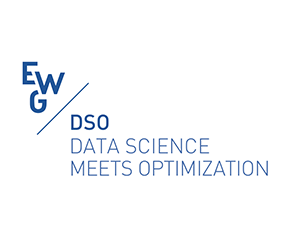Submit your abstract here using the codes mentioned below or find more information at the IFORS 2020 pages.
Sessions
Integrating Machine Learning in Optimization Methods
Chair: Kevin Tierney
code f5aa8377
This session will present the latest results for using machine learning to make decisions within the optimization procedure. Potential topics include, but are not limited to, ML based solution approaches for optimization problems (neural networks or otherwise), branching/bounding heuristics in exact algorithms and heuristics, heuristic design, algorithm configuration and selection methods, and reactive/intelligent (meta)heuristics.Better Decisions with Data
Chair: Yingqian Zhang
code 10eb80b7
The main question this session will address is the one on how to use learning (deep reinforcement learning, supervised machine learning, …) to improve decision making tasks by better handling the emerging optimization problems.Data Science and Optimization
Chair: Patrick De Causmaecker
code a825f35d
This session is on the broad link between data science and optimization and welcomes talks illustrating methodological aspects of integrating solutions taken from both domains, examples of optimization problems where both fields have been brought to synergy as well as talks on open problems arising from such attempts at integration.Optimization Models for Machine Learning
Chair: Dimitri Papadimitriou
code 4d71ef05
This session is dedicated to advances in optimization models and methods for both supervised/unsupervised machine learning problems and data analysis. This session invites contributions on all aspects of mathematical optimization (incl. stochastic, combinatorial, numerical) applied to inverse problems, nonlinear regression, probabilistic classification, as well as nonlinear dimensionality reduction, clustering, and association problems. Topics include –but are not limited– to i) experimental/numerical and formal studies, ii) performance and stability (incl. regularization methods), iii) (pre-)conditioning methods, iv) new methodological and algorithmic developments, and v) exploratory studies related to new research directions.Emerging Applications in Data Science and Optimization
Chair: Kevin Tierney
code deddbfe5
This session will present a broad palette of industrial applications
using data and optimization. Topics can include, for example, data-driven optimization approaches, optimization problems modeled under uncertainty, data analysis/business intelligence for use in
optimization. We explicitly welcome on-going work where the optimization aspect may not yet be fully defined and could benefit from discussion by the DSO community.Data Science and Metaheuristics
Chair: Ender Özcan
code 3f8fadc2
This session will present theory and practice-oriented studies on either dual or self-interaction between data science (machine learning, statistics, etc.) and metaheuristics (such as, tabu search, simulated annealing, genetic/memetic algorithms, VNS, GRASP, ant colony optimization). The subject of the presentation can relate to any of (but not limited to) the following areas where such an interaction is often observed: selection and generation hyper-heuristics (or any other adaptive, self-tuning, reactive, self-improving methods), meta-optimisation, meta-learning, algorithm selection, data pre-processing, model training, (hyper-)parameter tuning/control, transfer learning, Big Data, and more.Data Science in Optimization Algorithms
Chair: Andrew J. Parkes
code 17bec5d1Graphs, Data and Optimization
Chair: Pieter Leyman
code ca41ac6eThe Role of Mathematical Optimization in Data Science
Chair: Vanesa Guerrero
code 90d1408bAdvances in Optimization
Chair: Adam Górski
code 776964cdIndustrial Optimization
Chair: Grzegorz Pawlak
code be1e2396


